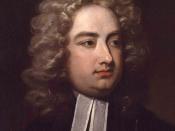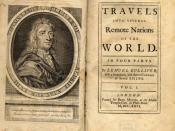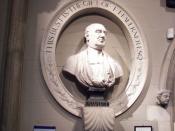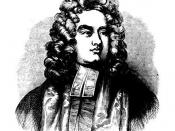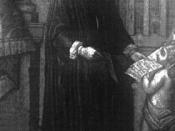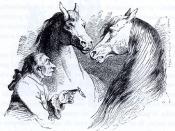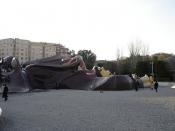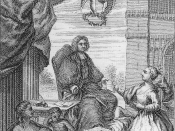The Truth is Hard to Swallow One can safely assume that an immense amount of controversy resulted with the publication of Jonathan Swift?s Gulliver?s Travels in 1726. A seemingly innocent tale of a traveler?s adventures, it is apparent that the true meaning underlying the text is a bold attack on the political and sociological aspects of eighteenth century England. This is clearly apparent throughout Gulliver?s voyages to Lilliput, Brobdingnag and Laputa as all three stories satirically depict different aspects of English society. The final voyage to Country of the Houyhnhnms is simply a harsh satire of the human condition. At a time when political England would have a person killed for any public criticism of government, Swift was being rather risqué with this satirical work, knowing that at times, the truth is hard the swallow.
The first adventure leads Gulliver to the island of Lilliput. The inhabitants of this strange land are all one-twelfth of Gulliver?s size and consider him to be a giant.
Even though Gulliver?s size makes him a threat to the tiny Lilliputians, they clearly have much power over him and his freedom. Gulliver gradually learns more about the political state of Lilliput and remarks that: Mistakes committed by Ignorance in a virtuous Disposition, would never be of such fatal consequence to the Publick Weal, as the Practices of a Man whose Inclinations led him to be corrupt, and had great Abilities to manage, and multiply, and defend his Corruptions. (pg. 49, Rivero) This observation is rather significant. In this first adventure, Swift is satirizing the English government. The way in which the tiny inhabitants of Lilliput control Gulliver represents the way in which the English government controls the entire country. More specifically, Gulliver?s statement expresses that one can free himself by simply manipulating the laws of the Lilliputians, which is precisely what Gulliver does to gain freedom from Lilliput.
Gulliver returns home only to embark on his second voyage to Brobdingnag. Here, the roles are reversed and Gulliver is but a twelfth the size of the inhabitants. There are two aspects to consider about this second voyage. The first is the way in which Gulliver is used for exhibition; he is on display just as dwarfs and giants are on display at exhibitions in England.
Perhaps even more significant is the second aspect of Gulliver?s adventure in Brobdingnag. Gulliver and the king spend quite some time discussing the political state of England. Gulliver is very proud of his country and is appalled when the king states: ?I cannot but conclude the bulk of your Natives to be the most pernicious Race of little odious Vermin that Nature ever suffered to crawl upon the Surface of the Earth? (pg. 111, Rivero). As a Brobdingnagian, the King cannot comprehend the political state of England, as the laws are contradictions of each other and the policy of war is but ignorance. In this second adventure, Swift focuses more on satirizing the sociological state of England.
The third voyage satirizes the new trends of science in England. It seems that Swift is attempting to display the need for English society to carefully observe its scientific position; that is, to ensure that there is a useful goal to the research being pursued. The inhabitants of Laputa are extremely intelligent in science and mathematics, but seem to lack common sense. The Laputians derive inventions that are useless, represented English scholars. Swift implies that too much science causes a lack of human emotion, suggesting that the two must remain in balance.
The radical of the four adventures is the final. The Country of the Houyhnhnms is a strange land inhabited by Houyhnhms and Yahoos. Swift has been criticized for this final chapter as it presents the reader with a grotesque image of him/her. This adventure is undoubtedly a satire of the human condition. Gulliver likes the Houyhnhms, but has clear distaste for the Yahoos. The Houyhnhms have all the good qualities; they are honest, intelligent, clean and civil. The Yahoos, however, are dirty, dishonest and unintelligent, complete opposites of the Houyhnhms. Gulliver considers himself to be a Houyhnhm in the beginning; he does not consider the possibility that he may have any common links to the Yahoos. As he learns more about the Houyhnhms, he begins to realize that he is very similar to the Yahoos. Swift is satirizing human beings as Yahoos in this last adventure. He has imagined a race superior to human beings and has harshly represented the faults of the human race. As this becomes more and more clear to Gulliver, he becomes disgusted with himself. This truth shakes him so deeply that upon returning to England he concludes: I am not the least provoked at the Sight of a Lawyer, a Pick-pocket, a Colonel, a Fool, a Lord, a Gamester, a Politician, a Whore-Master, a Physician, an Evidence, a Suborner, and Attorney, a Traitor, or the like: This is all according to the due Course of Things: (pg 250, Rivero).
Gulliver essentially realizes that the English government and society of which he was so proud, is not nearly as perfect as first assumed. In this final statement to the readers, he indicates that he no longer sees the distinction between the different classes of English people. For him, they are all Yahoos.
It becomes apparent to Gulliver, as well as the reader, that perhaps one should not consider virtue without considering vices. Swift?s satire of England was a controversial work because he was satirizing a realistic situation. Gulliver?s Travels is not a simple collection of four adventures; it is satirizing the truth in a time when the truth was condemned. Swift not only satirizes England, English politics or society or the human condition, he proves that the truth can be hard to swallow.
Bibliography Rivero, Albert J., ed. Gulliver?s Travels. By Jonathan Swift. New York: Norton, 2002.
Rodino, Richard H. ???Splendide Mendax?: Authors, Characters, and Readers in Gulliver?s Travels.? Rivero 396-427.
Todd, Denis. ?The Hairy Maid at the Harpsichord: Some Speculations on the Meaning of Gulliver?s Travels.? Rivero 396-427.
